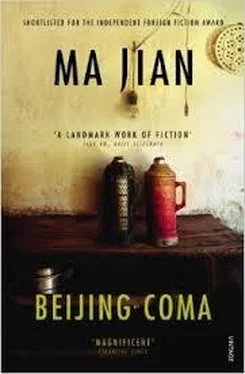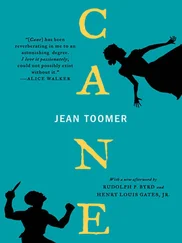‘Shi Ye is A-Mei’s old classmate, not yours,’ she said, following me back down to the Square. Big Chan and Little Chan were dunking brushes into a bowl of ink and painting onto the stone wall of the Monument: 4 JUNE IS THE BLACKEST DAY IN CHINESE HISTORY…
Tian Yi gripped my arm. I could tell she was as afraid as Bai Ling.
Suddenly, in the north-western corner of the Square, I caught sight of an armoured vehicle. It was ramming into a wall of bollards that residents had placed across Changan Avenue, a few metres from where Mou Sen had staged the Democracy University’s opening ceremony. A small crowd of students ran over and tossed stones and petrol bombs at it, and soon flames darted across its roof as it continued to bash into the barricade. Reflected firelight danced across the Goddess of Democracy and the rows of nylon tents nearby.
‘Hurry! There’s an armoured vehicle trying to force its way into the Square.’ I grabbed Tian Yi’s arm and we sprinted off in the opposite direction. Before we’d gone very far, I looked up and saw a black mass of soldiers in combat gear, armed with long truncheons, line up on the steps of the Museum of Chinese History.
Tian Yi stood still. ‘Stop!’ she cried, pulling me back. ‘Don’t go any further.’
It suddenly occurred to me that the soldiers must have been lurking inside the Museum of Chinese History all along.
I tried to think of somewhere else for Tian Yi to hide, but realised it would be too dangerous to go running through the Square now.
Some of the Beijing residents scattered around us were holding metal rods and beer bottles, and were about to hurl them at the soldiers on the steps. I rushed over and said, ‘I’m Dai Wei, head of security. The Defend Tiananmen Square Headquarters has requested that everyone discard their weapons and maintain our policy of peaceful resistance.’ Then I told Tian Yi to return to the Monument and tell Bai Ling that the army was now standing right opposite us.
As she turned to leave, she saw a girl sitting under a lamp post reading a book. ‘What are you doing?’ Tian Yi cried. ‘Can’t you see the army’s here?’
‘If they turf us out of the Square, we’ll go back to the campus,’ the girl said, looking up. ‘What’s the big deal?’
‘Look, this is a bullet cartridge,’ Tian Yi said. ‘The army are shooting to kill. I need you to help me. Go and tell the Headquarters that there’s a huge battalion of troops standing on the steps of the Museum of Chinese History. Give the message to Bai Ling. Say it’s from Tian Yi.’
The girl got up reluctantly and stared at the cartridge in Tian Yi’s hand.
Tian Yi then came back to my side and shouted, ‘Fellow students, let’s sing the PLA song, “Three Rules of Discipline and Eight Points of Attention”.’
Just at that moment, a signal flare shot through the sky. Its pale glow looked like the ghostly light that illuminates the dead souls’ path to hell.
A sound of gunfire rang out from the north-east corner of the Square. The bangs echoed against the northern walls of the Museum of Chinese History. The thousands of soldiers outside the Museum could hear it too, but they remained completely still, standing packed on the steps like a swarm of green bats.
‘We’re done for, we’re done for,’ I muttered to myself, my body clenching with fear. I thought of taking Tian Yi down into the underpass below Changan Avenue, but before I had time to move, a frantic crowd came running down from the north-east corner and raced to the ambulance parked outside the Square’s emergency tent. A wounded man, covered in blood from head to toe, was being wheeled along on a bicycle. A younger man with blood pouring from his thigh walked beside him. As he was carried onto the ambulance, he shook his head from side to side and shouted, ‘Did you see that? Did you see that?’ then closed his eyes and fell silent.
Someone shouted madly, ‘You butchers! How could you turn your guns on the people! The gods will punish you!’ Others ran over to the Museum to hurl stones and beer bottles at the soldiers sitting on the steps. The soldiers jumped to their feet and looked as though they were about to strike back, but the colonel standing in front waved his hand, and they all stood still. Then three soldiers in Changan Avenue ran towards us, pursued by an enraged crowd. One of them was knocked to the ground, the other two sprinted over to the Museum’s steps. The troops were furious, and seemed ready to attack. Four students went to help the fallen soldier. As they lifted him to his feet, some angry civilians leaned down, punched the soldier’s face and pulled off his helmet.
A boy who looked about ten years old ran past us. Tian Yi tried to grab hold of him, but he slipped through her fingers and ran off towards the Museum. ‘My brother has been killed!’ he shouted, then raced towards the troops on the steps. A small crowd wielding branches and metal rods followed behind him. Tian Yi caught up with him and managed to hold him back. A few female students surrounded the colonel and pleaded with him to tell the soldiers not to shoot. A short student from Hong Kong fell to her knees and sobbed, ‘You can’t fire your guns at the students!’
I got everyone to cry out to the troops, ‘The People’s Army loves the people! The Chinese people don’t shoot their fellow countrymen!’
Tian Yi went over to the colonel, pointed to her university badge and said, ‘I’m a Beijing University student. We follow a policy of non-resistance. You saw how we went to the aid of that soldier just now.’
‘If you shoot us, history will never forgive you!’ I butted in. The colonel lowered his head and remained silent. The boy saw a tricycle cart pass by and chased after it.
‘That kid has gone mad…’
‘Perhaps that was his brother’s cart,’ I said. ‘Tian Yi, we must go back and tell Bai Ling what’s happening.’ Wang Fei had got hold of an army machine gun and had hidden it in one of the tents. He had set up his own secret suicide squad. I knew that if he got out the gun and deployed the squad, it would provoke a massacre.
Tian Yi and I ran towards the Monument. Students holding wooden sticks ran past us, heading for an armoured vehicle that had caught fire. An old man was shouting out to some members of the Workers’ Federation’s Dare-to-Die Squad, ‘Do as the students have asked and put down your weapons…’ Then he knelt on the ground and wept.
Another prolonged burst of machine-gun fire erupted in Changan Avenue. The noise numbed my ears. Tian Yi and I stood still. The gunfire stopped. I heard a crowd yelling angry slogans, then saw someone carrying the limp body of the young boy we’d just seen. There was blood dripping from him. It looked like he’d been shot dead.
I broke into a cold sweat. ‘It’s too dangerous out here!’ I said, pulling Tian Yi towards the underpass. I thought we’d be safer in there. But as we approached the entrance, another round of gunfire rang out, and in a panic we threw ourselves to the ground.
I looked up to see what was going on. The troops and tanks had sealed Changan Avenue at the north-east corner of the Square. A small crowd of people were crouching behind the low cement wall of the underpass’s entrance. I couldn’t tell whether they were civilians or students. I guessed they were within range of the machine guns’ bullets, and were too afraid to move.
Two workers holding metal rods crept over to us and said, ‘You’ll be killed if you lie here any longer. Those bastards are shooting everyone in sight! If you don’t have weapons, get out of here!’
‘Is there anyone in the underpass?’ I asked.
‘If you go inside, you’ll never get out again. There are thousands of people down there already. Run south to Qianmen Road. The army hasn’t sealed it off yet.’
Читать дальше












